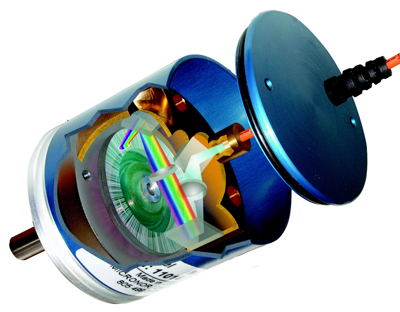`First` fibre optic position sensor is immune from EMI
The Swiss-US sensing specialist Micronor claims to have developed the world`s first fibre-optic-based absolute position sensor. The MR330 sensor has a passive, all-optical design that makes it immune from electromagnetic interference such as fields produced by electric motors, welding, lightning, radiation or other extreme conditions. It is can also sense positions over distances of hundreds of metres without being affected by earth loop problems.

“The uniqueness of the system is that the sensor is entirely passive, meaning that there are no electronic components whatsoever in the unit,” explains Micronor’s chief engineer, Robert Rickenbach. “The result is that the sensor can be directly deployed in extreme environments where conventional electronic-based encoders have distinct limitations.”
The sensor contains a novel optical technology which is connected to an active controller via a duplex fibre-optic link. The controller sends a burst of light along the fibre to a code disk in the sensor which modulates the spectral components of the light, based on its angular position. The position information is imprinted on the optical spectrum and sent back to the controller which generates a precise position readout. The readings are not affected by changes in light intensity in the fibres.
The sensor can measure absolute angular positions through a full 360 degrees with a 13-bit (8,192-count) resolution at speeds of more than 2,500 rpm. Multiple turns can be tracked to a 12-bit (4,096-revolution) accuracy.
The sensor’s accuracy and EMI immunity make it ideal for applications that require precise motion control and position measurement in challenging environments. These include actuator systems, transportation systems, steel mills, wind turbines and oil rigs. The sensor meets Atex requirements for use in mines and other explosive atmospheres.

The controller (above, right), powered by 24V DC, incorporates several communications interfaces and supports protocols that provide compatibility with most motion systems.
A video showing how the system operates can be viewed on YouTube.





